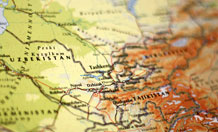
Map of Central Asia
New funding for research on conflict management in Central Asia
Three incidents of armed conflict in Uzbekistan, Tajikistan and Kyrgyzstan form the focus of a major new research project assessing the effect of conflict management in Central Asia and how this affects the development of relationships with these young countries.
The £0.5 million project is funded by the Economic and Social Research Council (ESRC) and led by Dr John Heathershaw from the University of Exeter, in collaboration with Newcastle University, University of Bradford and the non-governmental organisation Saferworld. The research project ‘Rising powers and conflict management in Central Asia’ will be taking place over a three year period.
Uzbekistan, Tajikistan and Kyrgyzstan are situated between Russia, China and Afghanistan. Their strategic position is of considerable interest to the USA, Russia and China who all have vested economic interests and/or military personnel in Central Asia. The USA uses air bases in Uzbekistan and Kyrgyzstan to support their war efforts in Afghanistan. Russia also has bases in Kyrgyzstan and Tajikistan while considering the Central Asian republics – former Soviet states – to be part of its ‘near abroad’. China has resolved its border disputes with Tajikistan and Kyrgyzstan, but is now building strong trade links based around the use of raw materials such as copper, gold and gas and new security arrangements through the Shanghai Cooperation Organisation. Despite these apparently competing interests there has been little open contention between the great powers. The research project will look behind the scenes at how their involvement in conflict management affects political dynamics and state formation in Uzbekistan, Tajikistan and Kyrgyzstan.
The incidences of armed conflict which the project focuses on include the suppression of a prison-break and apparent uprising by the government of Uzbekistan; inter-ethnic violence in Kyrgyzstan; and armed rebellion in the Rasht valley of Tajikistan. The international responses to these armed conflicts were complex and inconsistent. None of the cases involved international military intervention yet the political positions and diplomatic initiatives of the great powers were important in affecting how the conflicts were managed nationally and internationally.
Dr Heathershaw said: “The aim of the research is to explain the apparent failure of Western approaches to shape how national governments manage conflict in the region. For example, in Uzbekistan, the US State Department and some European governments led calls for an international investigation of the violence in Andijon and made demands for reform. However, the government of Uzbekistan, with the diplomatic support of Russia and China, was recalcitrant and temporarily expelled the US from its airbase in the country. Today the United States has returned to its air transit centre in Uzbekistan but its relationship with the government is weaker and it has taken a less assertive line in its responses to subsequent Central Asian conflicts.”
He added:“Authoritarian, state-led strategies implicitly or explicitly supported by Russia and China seem to have been more effective at managing conflict in Central Asia in the short-term but they have their own inadvertent effects such as increasing nationalism.”
The objective of the project is to improve our understanding of different approaches to conflict management and their direct and indirect effects. The project also seeks to inform more effective responses to conflict in Central Asia in the context of more inter-dependent relationships between the Central Asian states, Russia, a rising China, and the Western powers.
Date: 15 November 2012
